Nuns
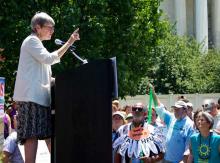
This time it’s the Catholic sisters versus the Koch brothers.
That’s one way to look at the upcoming “Nuns on the Bus” tour, which hits the road Sept. 17 for the third time in three years, a monthlong trip though 10 key U.S. Senate battleground states to campaign against the influence of outside money on politics.
The issue has come to be identified with the wealthy industrialist brothers Charles and David Koch, whose huge contributions to conservative political causes have raised concerns about the role of “dark money” on elections.
The spigot for such undisclosed donations, which can be made by unions as well as corporations, was opened by the controversial 2010 Citizens United Supreme Court decision. That was followed by another 5-4 ruling in April of this year, McCutcheon v. Federal Election Commission.

A new model of leadership that’s been refined in the fires of change and conflict is emerging from U.S. religious women.
In June, the Institute for Policy Research and Catholic Studies, along with Solidarity with Sisters, invited 150 people to Catholic University for an opportunity to discuss the model of leadership that has developed in Catholic women’s communities around the world over the last 50 years since Vatican II. The event coincided with the release of Spiritual Leadership for Challenging Times, an anthology of 10 addresses given by Leadership Conference of Women Religious (LCWR) presidents.
Catholic sisters are emerging as leaders ahead of their times. From Sister Simone Campbell, SSS, and Nuns on the Bus to Catholic Health Association CEO Sister Carol Keehan, DC, who helped pass the Affordable Care Act, to former LCWR president Sister Pat Farrell, OSF, who practiced authentic spiritual leadership in the face of the Vatican’s ongoing investigation of that organization (an investigation that Pope Francis should have laid quietly to rest, but has not), religious women are getting notice for their thoughtful, faithful leadership in the face of withering criticism and their own communities’ dramatic changes.
What are the marks of this new leadership?

An 84-year-old nun was sentenced to nearly three years in prison on Tuesday for breaking into a Tennessee nuclear facility in July 2012.
Sister Megan Rice and two other anti-nuclear activists were convicted last May of breaking into a federal complex that stores enriched uranium.
“Please have no leniency on me. To remain in prison for the rest of my life would be the greatest honor you could give me,” Rice told the federal judge at her sentencing hearing, according to USA Today.
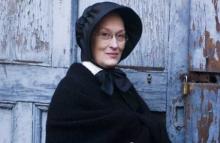
From Julie Andrews’ performance as Maria in the 1965 film “The Sound of Music” to Meryl Streep’s portrayal of Sister Aloysius Beauvier in “Doubt” (2008), many Hollywood actresses are particularly conspicuous for their habits. But although habits or veils are thought to symbolize purity – and especially chastity — some films presented a more complicated portrait of nuns.
The title of Maureen Sabine’s new book, “Veiled Desires: Intimate Portrayals of Nuns in Postwar Anglo-American Film” (Fordham University Press), refers to the paradox of having charismatic and photogenic actresses playing chaste nuns and, in the process, drawing attention to the desires their habits were thought to stifle.

NEW YORK — The “Nuns on the Bus” are revving up their engines for another national campaign, only this time the Catholic sisters are taking their mobile platform for social justice along the country’s Southern border to push Congress to pass immigration reform.
“The ‘Nuns on the Bus’ is going on the road again!” Sister Simone Campbell, head of the social justice lobby Network, told an enthusiastic gathering of faith leaders and charity activists at a Manhattan awards ceremony Wednesday (May 1).
“This time we’re going out for commonsense immigration reform,” she said to rousing applause.

Nearly a year after the Vatican announced a makeover of the largest umbrella group for American nuns, Pope Francis has directed that the overhaul of the Leadership Conference of Women Religious continue.
The decision, while not entirely unexpected, could nonetheless bring an end to Francis’ honeymoon with the many American Catholics who had viewed the crackdown on nuns as heavy-handed and unnecessary.
Archbishop Gerhard Ludwig Mueller, who heads the Vatican’s Congregation for the Doctrine of the Faith, met on Monday with the LCWR’s leadership for the first time since Francis’ election on March 13.
According to a Vatican statement, during a recent discussion of the case with Mueller, Francis “reaffirmed the findings” of the Vatican investigation and the “program of reform” for LCWR that was announced on April 18, 2012.
SOME BOOKS MAKE you want to sit down with the author on a sunny afternoon for a nice cup of tea. You would be excited to talk about how the book resonated with your own journey. For me, From Willow Creek to Sacred Heart: Rekindling My Love for Catholicism, by Chris Haw, is such a book.
Haw, a young, passionate, and deeply self-reflective theologian, shares his spiritual memoir. Part one recounts Haw's faith journey from a childhood as a lukewarm Catholic to teenage years at the evangelical megachurch Willow Creek, to college—including brief but powerful months in Belize, as well as days of protest against the Iraq war—and eventually to his present life in the apocalyptic landscape of Camden, N.J., where he returned to the Catholic Church.
Part two presents Haw's theological reflections on a variety of questions he has raised along his journey. He also focuses on common objections against the Catholic Church, such as the nature of the Mass as a sacrifice, the church's reliance on human tradition over the Bible, its hierarchical system, alleged ritualism, embellished architecture and ornaments, devastating scandals—including child molestation—and so on. Haw explores such challenging issues thoughtfully and courageously, while humbly accepting that he still struggles with them. Despite it all, Haw longs to see beauty and hope furthered through the Catholic Church.
I am a Catholic convert. I was raised in a Methodist family and trained in Protestant seminaries. By the time I decided to convert to Catholicism, I was starting my first year in the doctoral program of theological studies at Emory University. Feminist theology played a central role in both my theological education and spiritual formation, and it continues to today.


Editor's Note: Alyssa Bain tells her story of why she's part of the 20 percent of Americans who identify with "no religion in particular." Find more stories (or share your own) HERE. Read about the study HERE.
Last weekend I watched Sister Act (both of them, actually) with some friends (who also happen to be nuns)
I am not a nun. I am not a novice. I am not Catholic. Some days I wonder if I am even Christian.
According to a recent study by the Pew Forum, I actually just might be a “none.”
The research is out, and it seems that my generation is stumping the world as the generation that, for whatever reason, refuses to label itself.
Personally, I’ve been having trouble with labeling myself for quite some time. Lutheran. Non-denominational. Methodist. Universalist. Evangelical. Protestant.
But none of them quite fit right. The problem with labels is that there are always exceptions. Nothing is black and white. The label “none” lumps together atheists, agnostics, and, well, me. I am not an atheist. I might be kind of agnostic, but there really is just something about that Jesus guy.

In what is being described as the first of its kind in the U.S., the Archdiocese of New Orleans has transformed a vacant church rectory into a group house where single women will live together while deciding whether to undertake lives as nuns.
The center, dedicated on Aug. 15, occupies the second and third floors of the St. Rita rectory. Within a few days, two women, then perhaps three more, will move into the spotless rectory, their collective lives to be superintended by two veteran nuns who will show the younger women the dynamics of shared community life.
“How we live in community. How to communicate. How to share,” said Sister Carmen Bertrand, for 48 years a member of the Sisters of the Holy Family.
Beyond orienting them to the rhythms of community life, Bertrand and her colleague, Sister Diane Roche, a Religious of the Sacred Heart, will teach the tenants various modes of prayer, organize occasional retreats, and bring in representatives of other religious orders to present themselves and their ways of life.
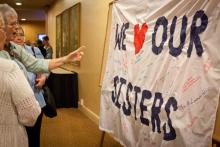
A leader of the group of Catholic nuns who are facing a crackdown from the Vatican said on Thursday that her members have no plans or desire to leave the church, or reconstitute their group beyond Vatican control.
Sister Mary Hughes, who ended a three-year term as president of the Leadership Conference of Women Religious on Aug. 11, said there is little-to-no support to withdraw the LCWR from the church, where it could avoid a Vatican-order makeover.
"It is the deep desire of the membership to stay within the church and not move away from it," Hughes said at a luncheon at the National Press Club. "We derive our strength from the sacramental life of the church."
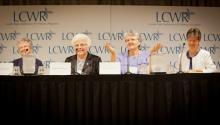
American nuns facing a Vatican takeover of their leadership organization on Aug. 10 rejected Rome’s plans to recast the group in a more conservative mold, but declined — for now — to respond with an ultimatum that could have created an unprecedented schism between the sisters and the hierarchy.
Instead, the nuns said they wanted to pursue a negotiated solution to the showdown that has galvanized American Catholics in recent months and prompted an outpouring of support for the sisters that left the Vatican with a black eye.
The statement from the Leadership Conference of Women Religious came at the end of the LCWR’s annual assembly here and was the first formal response to the Vatican from the entire organization, which represents most of the 56,000 nuns in the U.S.
The Vatican announced in April that it was assigning a team of bishops to take control of the LCWR in order to make the organization — and by extension, most U.S. nuns — hew more closely and publicly to orthodox teachings on sexuality and theology.
Sister Pat Farrell, the outgoing president of the LCWR, on Friday read the official response that expressed the organization’s “deep disappointment” with Rome’s verdict. But the statement also said the nuns wanted to keep talking with the hierarchy in hopes of “creating more possibilities for the laity and, particularly for women, to have a voice in the church.”
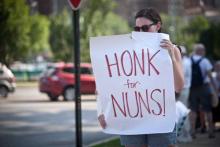
Catholic sisters gathered in St. Louis for their annual assembly on Thursday intensified discussions aimed at thwarting a Vatican takeover of their group, but hanging over the meeting was an even larger existential question: Do the nuns have a future?
The viability issue is central to the dispute between Rome and the nuns that has riveted Catholics and dominated this year's meeting of the Leadership Conference of Women Religious. The steering group represents most of the 56,000 nuns in religious orders in the United States.
The Vatican announced in April that a team of bishops would take control of the LCWR in order to make the nuns hew more closely and publicly to orthodox teachings on sexuality and theology. The sisters are expected to deliver their first formal reply to the takeover on Friday.
A key justification for Rome's action was the argument that vocations to more progressive women's religious communities are in free fall: In 1965 there were 180,000 sisters in religious life, more than three times today's number. The decline is especially acute in orders that belong to the LCWR.

As hundreds of nuns met in St. Louis on Wednesday to begin crafting an answer to Vatican demands that their leaders toe the line on orthodoxy, there was a pervasive sense that this week's discussions could lead to a fateful juncture in the history of Catholicism in America.
"As you know, this is an assembly like no other assembly we've had," said Sister Pat Farrell, a Franciscan from Iowa who heads the Leadership Conference of Women Religious, which represents most of the 56,000 nuns in communities across the country.
"I suspect we're in for a lot of surprises," Farrell told the sisters as she opened the LCWR's annual meeting.
The options under consideration by the 900 nuns — several hundred more than have attended recent gatherings — range from asking the Vatican to continue the dialogue to shuttering the LCWR and reorganizing the leadership body of sisters into a group that would be beyond the Vatican's control.
But that would also signal a historic shift in a church in which the nuns for centuries simply did the work that the bishops preached about — serving the poor, caring for the sick, and educating the young.
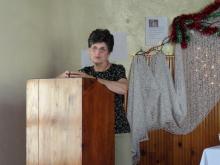
Though she is at the center of one of the biggest crises in the Catholic Church today, Sister Pat Farrell is loath to talk about herself, and certainly not in any way that would make her a focus of the looming showdown between the Vatican and American nuns.
To be sure, Farrell has spoken publicly and with quiet clarity about why the organization she heads, the Leadership Conference of Women Religious, rejects Rome’s plans to take control of the umbrella group that represents most of the 57,000 nuns in the U.S.
In announcing its proposed takeover last April, the Vatican accused the nuns of embracing a “radical feminism” that questions church teachings and focuses too much on social justice causes. Farrell says the American sisters are simply doing what the gospel requires, often speaking on behalf of so many in the church who have no one else to advocate for them.
The high-profile confrontation will reach another crucial pass next week (Aug. 7-10) when LCWR members gather in St. Louis to develop a formal response to the Vatican’s plans. Options run the gamut from complying with all of Rome’s directives (unlikely) to decertifying the group and re-establishing it outside of the pope’s control (a possibility).
Last month, Sister Pat Farrell, president of the Leadership Conference of Women Religious, traveled to the Vatican to discuss the not-so-favorable assessment of her group.
If you’ll remember, the verdict was that the LCWR – which represents 80 percent of Catholic sisters in the U.S. – undermines Roman Catholic teaching on homosexuality and birth control, while promoting “radical feminist themes.”
Today on WHYY’s Fresh Air, Sister Farrell talks with Terry Gross about how to deal with conflict. She tells Gross that as the sisters prepare for the national assembly in August, they are busy dialoging and gathering perspectives, hoping to “somehow, in a spirited, nonviolent strategizing, look for maybe a third way that refuses to define the mandate and the issues in such black and white terms.”
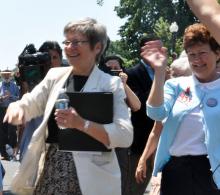
Hundreds of supporters were on hand to welcome home the Nuns on the Bus on Monday at the United Methodist Building in Washington, D.C. The sisters completed their nine-state, two-week journey for faith, family, and fairness in the federal budget.
"Some Catholic politicians are pushing budget cuts that violate Catholic social teaching," said Sister Simone Campbell, executive director for the Catholic lobbying group NETWORK. "And they jeopardize the Catholic sisters' effort to really help struggling families, to practice the values of the Gospel by serving the poor and vulnerable."
AFTER THE VATICAN’S “hostile takeover” of the Leadership Conference of Women Religious in April, I was particularly struck by one joke I encountered: “Go Catholic ... and leave the thinking to us.”
I laughed—but not much. That one, it seems, is too close to the truth these days.
The Leadership Conference of Women Religious (LCWR), a major educational center for superiors of Catholic women’s religious orders in the U.S., was launched in 1956 at the urging of the Vatican. For years, it has been a venue where officers of every congregation of women religious are invited to meet, study, and consider together the role and place of women religious in the resolution of the issues of the time. Now the LCWR has been put under the control of three bishops: Peter Sartain of Seattle; Leonard Blair of Toledo, Ohio; and Thomas John Paprocki of Springfield, Illinois.
The officers and body of the LCWR—all superiors, prioresses, or other officials of major, longstanding institutions—are no longer authorized to plan its programs, engage its speakers, or create and implement its structures. Instead, Sartain, Blair, and Paprocki have been appointed to oversee the group: to approve its programs, create its constitutions, determine its operational procedures, and define the content of its conferences. As in, “Leave the thinking to us.”
As in, women can’t do it themselves. Or, women aren’t moral agents. Or, women don’t know what they’re doing. Or, the girls need to be controlled. Or, father knows best.
Relations between the Vatican and the American nuns who are under investigation seem to be worsening after the sisters said on June 18 that initial discussions with Rome about a resolution to their standoff were “difficult” and that comments by several U.S. bishops have not made negotiations easier.
The statement by the board of the Leadership Conference of Women Religious, as well as subsequent remarks by the nun who heads the LCWR, may herald a longer and broader struggle inside the church.
“We have never considered ourselves in any way unfaithful to the church, but if questioning is interpreted as defiance, that puts us in a very difficult position,” Sister Pat Farrell, head of the LCWR, said in an interview with the National Catholic Reporter on Monday.

Leaders of an umbrella group that represents the majority of U.S. nuns met with top Vatican doctrinal officials on June 12 in an atmosphere of “openness and cordiality,” according to a Vatican statement.
Still, the Vatican made clear that the Leadership Conference of Women Religious — which represents most of America's 57,000 nuns — "remains under the supreme direction of the Holy See" and appeared to offer little wiggle room in its crackdown on the nuns' leaders.
The meeting was called after the Vatican's doctrinal watchdog office, the Congregation for the Doctrine of the Faith, issued a "doctrinal assessment" this spring that criticized the LCWR for not speaking out strongly enough against gay marriage, women priests and abortion.
"America's nuns clearly support the gay agenda, but one nun really has the Vatican's chasubles in a bunch."
The Colbert Report
Get More: Colbert Report Full Episodes,Political Humor & Satire Blog,Video Archive
"NETWORK's Executive Director Sister Simone Campbell responds to the Vatican's "radical feminist" charges, and Stephen learns how to get into heaven."
The Colbert Report
Get More: Colbert Report Full Episodes,Political Humor & Satire Blog,Video Archive